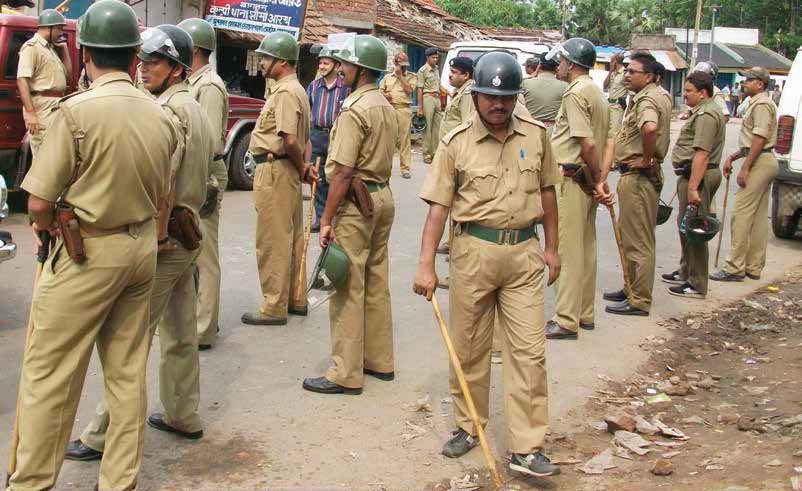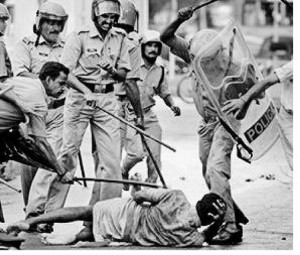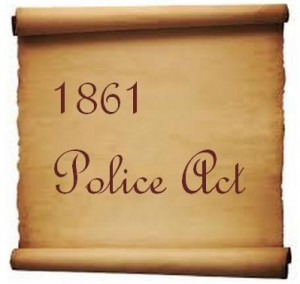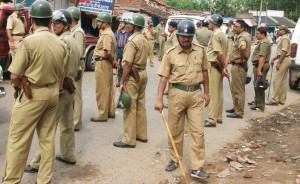In this blog post, Suhani Chanchlani, a student of Amity Law School, Delhi, writes about the imminent need for carrying out police reforms in letter and spirit throughout the Union of India.
In a democracy, the police are the nodal point between the government and the people. If any issue perturbs an individual, he/she is likely to approach the police rather than the politicians. Therefore, the strength of a democracy can very well be tested by the accessibility of the police to the public and also by the kind of relationship that exists between them. If the relationship is marked by animosity or suspicion, the democracy in that society is eroding from within. The reason being the government failing in its very objective of being representative of the people. If the basic link between the people and the government has snapped, how can the governors be aware of the problems faced by the governed?
Sadly, this is what is happening in the largest democracy of the world. Police have become a convenient tool in the hands of the powerful. The situation is so murky that it is no longer news when the police
- Do not meet out people with due respect and courtesy.
- Refuses to lodge a valid complaint.
- Takes bride for rendering its services which it is legally bound to do otherwise.
- Violently beats up the peaceful protestors.
- Does not impart its duties with due seriousness and promptness.
- Arrests someone arbitrarily or kills someone extrajudicially in an ‘encounter’.
On the face of it, the police itself is responsible for its untoward behavior. However, on closer investigations, it comes to the surface that police is just a cog in the wheel. Can we blame the police when their bread and butter depends on upon fulfilling favors of the powerful? This is not to say that the police should not be prosecuted for its excesses but that the police in India functions in an inherently broken system.
Indian Police Act of 1861
To elucidate this point, consider the Indian Police Act of 1861. This is the parent legislation which underpins policing in all the states and union territories. Among other shortfalls some of its lacunae are enlisted as hereunder:
- It vests the political executive with the power of superintendence over the police. However, it never laid down the scope of this ‘superintendence’. The Chief Ministers, in practice, remove the head of the police force without being obliged to provide any reasons.Promotions, demotions, transfers, everything, depends on the political favors that a police officer does but not on the rules and regulations that she/he follows or by their performance. The arbitrariness is not just prevalent in the upper rungs but is pervasive throughout the ranks and files of the police force. The higher police officers have the power to dismiss, promote or transfer their juniors without assigning any reasons. Thus, the police fail to perform its functions in a democratic manner. The reason being that the political elite uses the police as a tool against those who are opposed to This is well reflected in the political interference in the investigation processes leading to the false criminal implication of the innocents and exoneration of the defaulters.
- This act has nowhere made the police accountable to the public. The performance of the police force is not adjudged on a rational basis. The areas that report least number of crime rates are deemed to be ideal. This gives an impetus to police officers to fabricate crime statistics of their areas to showcase their ‘good’ performance.
- The duties of a police officer that have been provided in this Act are very limited in its scope. In its preamble, the prime objective of the police has been recognized as “the prevention and detection of crime.” This, however, does not take into account recent developments across the world that has resulted in giving a new meaning to the police. The role of the police in today`s conception of a welfare state is no longer restricted to prevention and detection of crime. The idea of community policing that is absent in this Act envisages the police to ensure a feeling of peace and harmony in the society. Thus, the police, among other things, is expected to play a meditative role to minimize conflicts, smoothen the process of legal proceedings to ensure rendering of justice and prevent the exploitation of the vulnerable sections of the society.
Besides this regressive legislation that governs the state of affairs, the police are acutely understaffed and poorly funded. According to a Human Rights Watch Report of 2008-09, there is just one civil police officer for every 1,037 Indian residents, far below Asia’s regional average of one police officer for 558 people and the global average of 333 people. To make matters worse, police besides performing its functions of law and order and crime investigation is also saddled with the burden of giving protection to VIPs and celebrities on a routine basis. Moreover, most of the ground work is delegated to low-ranked officers who do not even have any chances of being promoted to lucrative positions. These constables work under degrading conditions with the insurmountable amount of work. There is no system of shifts which means that the officers have to work continuously for long stretches that sometimes can even extend to 24 hours a day.
In today`s fast-changing world, the nations of the world are battling new security threats like terrorism, cyber-crime, et cetera. Moreover, Indian cops also have to combat Maoists and insurgent tendencies in J&K and tribal belts of the country. Even in such a scenario, the government is treating the police like a peripheral institution. The much-needed funds for modernisation of a police force that had been allocated in the union budget of 2014-15 have been substantially reduced by a recent central cut on a budget. The Ministry of Home Affairs has on the brighter side sanctioned non-planned expenditure for weapons and technology acquisitions. However, this would be of no avail if the police do not have infrastructure such as campuses where the forces need to be trained before they can use new weapons. This is the state of affairs even after India witnessed the most shocking terrorist attacks in Mumbai on 28/11 2008. This series of terrorist attacks apart from shaking the conscious of the nation brought to the surface the serious shortcomings in the infrastructure of the police. Even the top officials in the cadre used guns of the World War era. However, the terrorists possessed better arms and ammunition than the police themselves.
This leaves the states to fund their police forces on their account. But the police budgets in most states is committed to the extent of over 90% to the salaries alone. Thus, the police forces have to fend for themselves in most of the cases to maintain the fuel in the vehicles and also for the upkeep of the stations. This is done from the under the table bribes that the police routinely receive. Thus, most of the excesses committed by the police can be attributed to the lacunae in the system.
The rule of law runs like a golden thread in the Indian Constitution. However, this ideal is not reflected in as an integral institution as police. Keeping in mind the nation`s resolve for democracy and the rule of law, police reforms are the need of the hour.
There is already so much of literature in place on police reforms. The most prominent ones include National Police Commission`s Model Police Act, and also the one made by the Police Act Drafting Committee. The Supreme Court in Prakash Singh v. The Union ofIndia, has passed seven directives to the states for kick-starting police reforms. All that the states have to do is to follow the mandate of the Court either by formulating a new legislation or by issuing an executive order. Whereas most of the states have at least initiated police reforms to some an extent in the wake of this judgment. None of the states, however, have enacted police reforms in letter and spirit.
Conclusion
Thus, to enact police reforms, there has to be a political consensus. This is unlikely to happen as initiating police reforms would mean decimation in the powers of the political executive that they get to enjoy in the prevailing system. Unless the voters themselves unanimously pressurize the government for enacting reforms, they would never see the light of the day. Staying aloof from the police and other democratic institutions is not the solution. As a citizen of a democratic nation, every Indian has a right to be a part of a system that upholds their rights and not abuses them.
 Serato DJ Crack 2025Serato DJ PRO Crack
Serato DJ Crack 2025Serato DJ PRO Crack













 Allow notifications
Allow notifications


